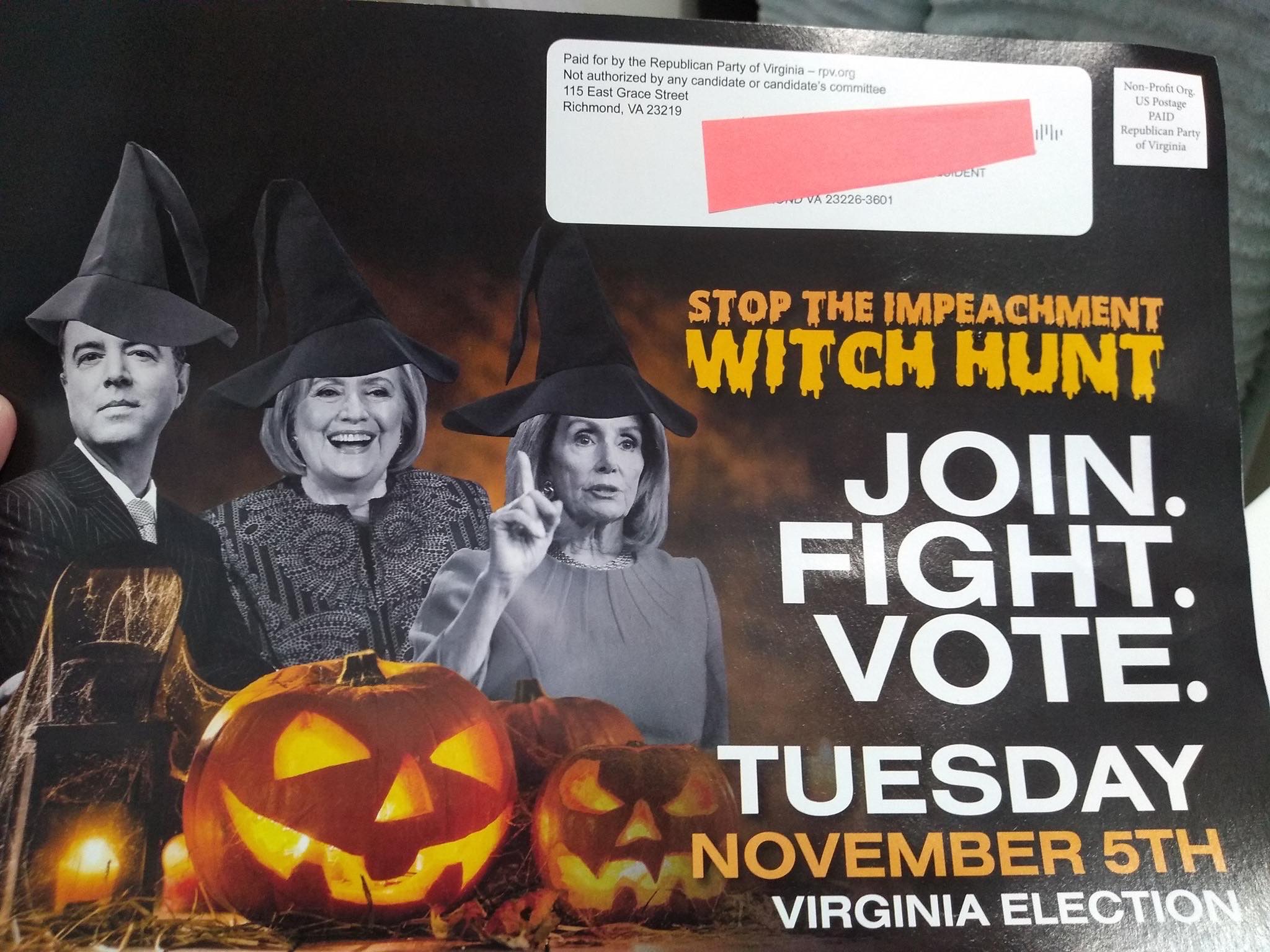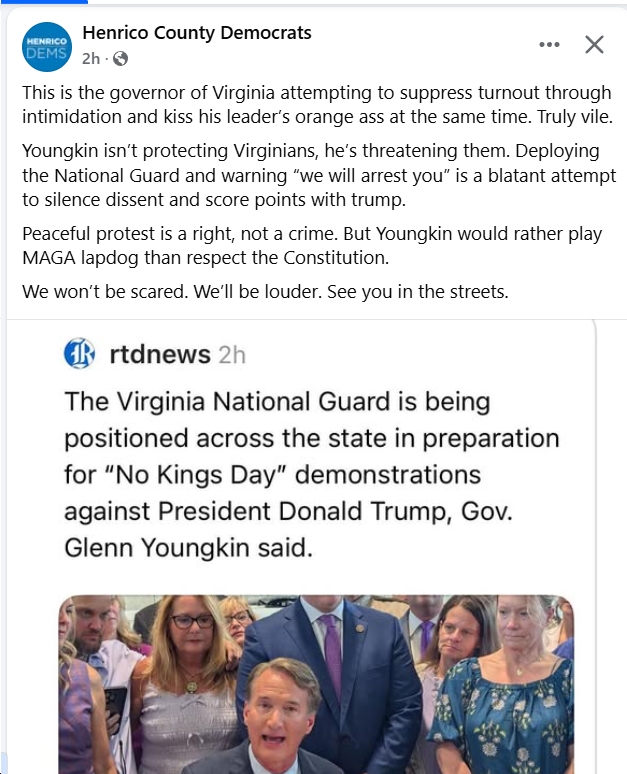by Brennan Gilmore, former Chief of Staff to Tom Perriello.
Tuesday, Virginians forcefully rejected Donald Trump and his divisive presidency in favor of the inclusive Virginia championed by Ralph Northam and Democrats up and down the ballot. Although Trump immediately claimed Gillespie lost because he failed to embrace Trump, for the past three months, Gillespie followed the Trump playbook, hook, line and sinker, with transparent attempts to exploit racial division and fear to appeal to white voters. It’s a playbook Republicans will unwisely continue to deploy into 2018 and one Democrats must continue to fight in order take back the House of Representatives. Reflecting on Tuesday’s results, here are five lessons for the future.
1. Primaries can be good for our party. Tuesday night, I was proud to see my former boss, Tom Perriello, getting well-deserved praise for his tireless work on behalf of the Democratic ticket and particularly House of Delegate candidates. Former Obama speechwriter and co-host of Pod Save America, Jon Favreau, tweeted, “Democrats everywhere could learn something from the way (Tom Perriello) threw everything he had into campaigning for his primary opponent.”
Democrats can also learn something from the primary campaign that Ralph and Tom ran in the first place. When Tom entered the race, some Virginia Democrats worried a primary would hurt our chances of winning in November. Not only did this primary not damage our party, it made us stronger. Ralph and Tom engaged in a substantive conversation about the issues most important to Virginia Democrats, which ultimately resulted in the most progressive nominee and platform in Virginia history. Both campaigns also helped get Democratic voters excited and engaged early in the year, and turnout in the Democratic primary was historically high, a trend that continued on Election Day, when turnout was higher than it’s been in 20 years.
In 2018 and beyond, we should not be scared of primaries. We should encourage substantive and rigorous debates, and then unify to defeat Republicans. After Ralph Northam won the primary in June, Tom immediately offered his full-fledged support. He then led Win Virginia, a Political Action Committee committed to electing Democrats across the Commonwealth, and attended over 100 events supporting Democratic candidates up and down the ticket. He also helped raise $500,000 in direct contributions to Democratic candidates and committees in Virginia.
2. Compete in every zip code with candidates who look like all of America. Democrats fielded 54 challengers this fall, more than doubling the previous cycle, and leaving only 12 Republican incumbents unopposed. Nearly all overperformed, many in districts that hadn’t seen a Democratic challenger in more than a decade. Over half of the new challengers were women, more than a quarter were candidates of color, and nearly a dozen were millennials. It is clear that from the numbers that House of Delegate campaigns, with dynamic candidates and intensive focus on local issues, drove turnout much higher.
Only a few weeks ago, almost no one thought that Democrats could win back the House of Delegates. The most optimistic projections were that Dems might gain a few seats. Tom Perriello, who helped orchestrate down-ballot victories across the state with Win Virginia, was one of those who felt otherwise. Throughout the primary campaign he told town hall audiences that with the right candidates stepping up Dems could harness anti-Trump movement energy to take back the House.
And the right candidates did step up. In Prince William County, Danica Roem will become the first transgender lawmaker after defeating Bob Marshall, an extreme conservative culture warrior who refused to debate Roem while misgendering her in the press. In Henrico, first time candidates Schuyler VanValkenberg and Debra Rodman picked up House seats that Democrats had not contested since 2007. In Virginia Beach, Kelly Fowler decided to run after attending the Women’s March in January and took down a four-term incumbent considered unbeatable one year ago.
Many of these candidates never considered running prior to Donald Trump’s election. Many of the groups that bolstered their campaigns — Indivisible, Run for Something, the Arena, and Win Virginia– were similarly born from the Resistance. While there are substantial forces within the party benefitting from inertia and the status quo, the DNC and Tom Perez also deserve a lot of credit for setting a new tone that fosters innovation. Susan Swecker and the Democratic Party of Virginia deserve credit for putting mission first and working seamlessly with new candidates and groups to enhance the existing party structure, rather than engaging in internecine turf disputes.
3. Democrats are winning the economic argument. Ed Gillespie spent most of his campaign appealing to white tribalism after his initial economic arguments fell flat. Last spring, he unveiled a tax plan that resurrected the disastrous Bush tax policies that bankrupted the middle class, pensions, and the federal budget to concentrate wealth in the hands of the richest few. It bombed. One primary opponent dismissed it as “phony math,” and the other came within one percentage point of besting him for the nomination while running on a neo-Confederate platform.
Meanwhile, Ralph Northam was the first nominee in Virginia history to support a $15/hour minimum wage and debt-free community college, along with universal access to early childhood education. Tom ran in the primary on the same platform. The only thing more striking than Virginia Democrats running on this platform was that Republicans did not run a single ad criticizing Northam for being too liberal on economic issues. Instead, they realized that these issue are popular with Virginia voters.
4. The Republican Party is the party of “identity politics.” As the decades-long alliance of the Southern Strategy and corporate America has frayed, Republicans who want to win realize only one of those groups has an actual base of voters. Forced to confront the fact that there is no longer a constituency for a pro-corporation, trickle-down economics platform, Republicans in Virginia fell back on race-baiting.
Perhaps no one embodies Corporate Republicanism more than Ed Gillespie, but after the terrorist attack in Charlottesville, he abandoned his “tax and spend” attacks on Democrats. While carefully condemning hate groups without condemning Trump, he then embraced their agenda – raising the spectre of mythical sanctuary cities in Virginia while defending Confederate war memorials. In his native New Jersey accent, Gillespie even cut a direct to camera ad arguing, “I’m for keeping ‘em up; he’s for taking ‘em down.”
In essence, Virginia proved that Senator Flake was right, and we should expect more retirements to come in rapid succession. As similar tactics in New Jersey showed, Republicans are increasingly stuck with two options: lose their dignity (along with elections) or get out. A third path, of rejecting race-baiting and the Koch-fueled extremism of the modern GOP in order to tilt back to the middle, is both imperative to Republicans and our Republic, but continues to be ignored.
5. Democratic voters will show up if you give them a reason. An “Inclusive Virginia” opposition to Donald Trump’s agenda and the divisiveness he represents was enough of a governing philosophy to turn out voters, persuade independents, and assemble a winning coalition. But there were other important factors motivating the record turnout we saw yesterday, all bolstered by a growing recognition that state politics matter, especially in the Trump era. From exit polls, it is clear that health care, and particularly Republican efforts to sabotage Obamacare, was the primary issue driving turnout. Northam’s consistent message of expanding access in Virginia in repudiation of these efforts undoubtedly boosted his margin, as did his unwavering defense of women’s reproductive health rights.
Guns too were on the ballot – not as a referendum, but as a key part of Northam’s message of support for common sense gun reform, including limiting access to assault rifles. His ‘F’ rating by the NRA apparently worked in his favor, as exit polls showed support for gun reform motivated base turnout, in contradiction of the traditional Virginia wisdom that centrist Dems should stay away from guns.
Due in part to strong work by the organization Virginia 2021, there was also an unprecedented focus on gerrymandering and its insidious effects on our democracy. Northam’s victory on Tuesday means that in 2021 legislative maps will be drawn by a non-partisan committee instead of gerrymandered to favor Republican interest. Between now and 2020 every state will elect Governors and state legislators with the same power — the results will determine the rules under which a decade of American elections are conducted.















